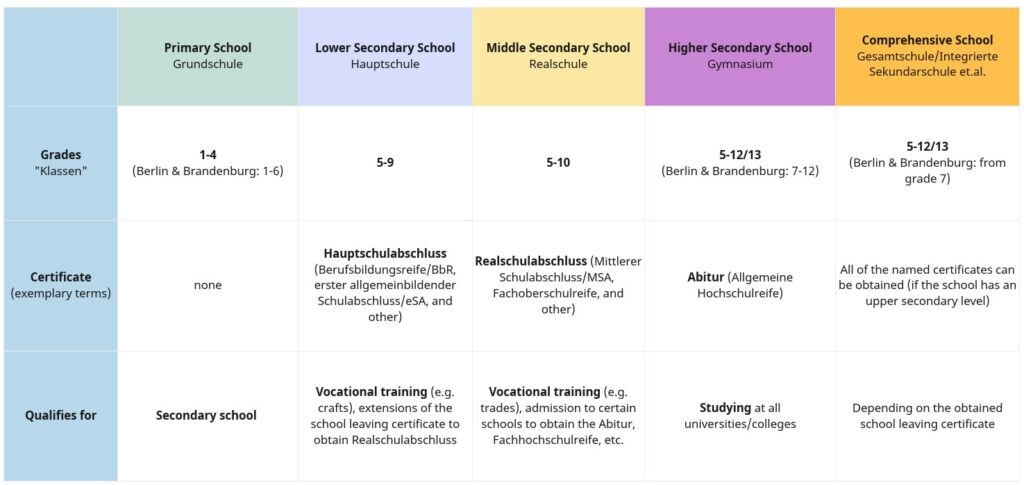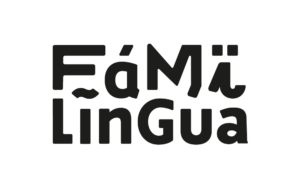Stages of primary and secondary education
- Primary School (Grundschule) from age 6-10/12
- Lower Secondary Level (at Hauptschule/lower secondary school, Realschule/middle secondary school, Gesamtschule/comprehensive school or Gymnasium/higher secondary school: ages 10/12-16
- Upper Secondary Level (at Gesamtschule or Gymnasium): ages 10/12-18, school leaving certificate Abitur
Kindergarten (often referred to as kita) is optional and not considered a part of the formal education system, whereas it is compulsory for all children living in Germany to attend school for nine or even ten years, depending on the federal state. Homeschooling is not allowed. After 9 or 10 years this so-called allgemeine Schulpflicht is fulfilled.
The subsequent compulsory vocational schooling (Berufsschulpflicht) until the age of 18 can be completed either by attending an upper secondary school or a (part-time) vocational school as part of vocational training.

Primary School: All Children Learning Together
Primary school, or Grundschule, lasts for four years (six in Berlin & Brandenburg). Children learn basic literacy and numeracy skills, subject matter as well as social and emotional development. Physical Education, arts, and music are also part of the curriculum.
Secondary School: Children take different paths
In the final year of primary school, the students’ academic strengths and weaknesses are assessed to determine which secondary school type is suitable for each one of them. In some federal states this assessment is a recommendation and the parents decide on whether they will follow it, whereas in others it is binding.
The next stage then is the lower secondary level, either at a Gesamt-, Haupt- or Realschule, or at a Gymnasium.
While the Hauptschule aims towards more hands-on skills and usually ends after year 9, Realschule combines hands-on skills and more academic education, ending after year 10. Both schools are prerequisites to apply for vocational training. A lower secondary school leaving certificate for example will be needed to start a craft apprenticeship. Many vocational trainings nowadays require a Realschule certificate though, in some cases even an Abitur.
Comprehensive schools combine Haupt- and Realschule and Gymnasium, so children learn together for longer. Their types vary between the different federal states and need to be researched individually. In Berlin for instance, there is no partition into Haupt- and Realschule anymore: Both school types have been replaced by the Integrierte Sekundarschule (ISS), children attending a Gemeinschaftsschule even stay together from grades 1-10/13.
Entrance Ticket to University: the Abitur
After finishing the lower secondary level, students attending a Gymnasium or comprehensive school can transfer to the upper secondary level, which is geared towards preparing students for university. Gymnasiums focus on academic subjects such as math, science, and languages. Students who attend an upper secondary level are expected to take the Abitur, a set of tests that determines university eligibility.
Students having completed the Realschule certificate can apply for a spot, for instance, at a Fachoberschule afterwards if they want to obtain an Abitur. Like the different types of comprehensive school, the routes to the Abitur after the Realschulabschluss differ from state to state.
Admission
The process of admission to schools varies a lot: While primary schools are often allocated based on the place of living, secondary schools can have different procedures to follow. Many gymnasiums and comprehensive schools are highly sought-after and some even do entrance exams. Therefore, it is crucial to research the admission requirements of secondary schools in your specific federal state.
Private Schools
One notable feature of the German school system is that public education is free and provided by the state. Private schools are available, charging fees often high, but mostly depending on the income of the parents. The quality of private education does not necessarily surpass that of public schools because teachers at public schools in Germany are (in most cases) civil servants who are well paid and enjoy good coverage for illness and retirement. Not all private schools can compete with these conditions, which is why they are also suffering from the very serious shortage of teachers in Germany at the moment. If you are looking for a certain pedagogical approach or the opportunity to gain an international school leaving certificate, it might however be worth looking into the range of private schools available where you live.
Deciding wisely
If you want to make a well-informed decision about your children’s education, I recommend researching schools well in advance. Not only the type of school but also the curriculum, extracurricular activities, neighbourhood and pedagogical orientation can be important for your child’s schooling experience. Keep in mind that for instance long commuting might impact your family’s well-being as well as the existence of all-day-schooling or a focus on musical education.
If you need help finding the right school for your child, don’t hesitate to contact us for our school support service. If your child is an English-speaker, my business partner Elle, an experienced British primary school teacher, caters to them with English proficiency online classes and preparation courses to access bilingual or international schools.
I hope your and your family’s journey will be a successful and enjoyable one!
Guest author:

Christin, a high school teacher with more than 10 years of experience now running FamiLingua, a business to support international parents regarding schooling and (bilingual) education.
© Text, table, and photo: FamiLingua – Parkinson & Zylberberg GbR 2024; logo: Parkinson & Zylberberg GbR 2021.
You can reach out to her webpage using the linkat the logo:









